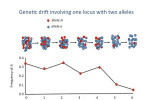 11 Terms
11 TermsHome > Industry/Domain > Archaeology > Evolution
Evolution
Of or pertaining to the change in the genetic composition of a population during successive generations, as a result of natural selection acting on the genetic variation among individuals, and resulting in the development of new species.
Industry: Archaeology
Add a new termContributors in Evolution
Evolution
brachiopod
Archaeology; Evolution
Commonly known as "lamp shells," these marine invertebrates resemble bivalve mollusks because of their hinged shells. Brachiopods were at their greatest abundance during the Paleozoic and Mesozoic ...

genetic drift
Archaeology; Evolution
Changes in the frequencies of alleles in a population that occur by chance, rather than because of natural selection.
speciation
Archaeology; Evolution
Changes in related organisms to the point where they are different enough to be considered separate species. This occurs when populations of one species are separated and adapt to their new ...
cephalopod
Archaeology; Evolution
Cephalopods include squid, octopi, cuttlefish, and chambered nautiluses. They are mollusks with tentacles and move by forcing water through their bodies like a jet.
mitosis
Archaeology; Evolution
Cell division. All cell division in multicellular organisms occurs by mitosis except for the special division called meiosis that generates the gametes.
Robert FitzRoy
Archaeology; Evolution
Captain of the Beagle, which took Charles Darwin on his famous voyage to South America and around the world. FitzRoy's chief mission on the Beagle was to chart the coast of South America. He also ...
heritability
Archaeology; Evolution
Broadly, the proportion of variation (more strictly, variance) in a phenotypic character in a population that is due to individual differences in genotypes. Narrowly, it is defined as the proportion ...
Featured blossaries
nicktruth
0
Terms
1
Blossaries
0
Followers
21 CFR Part 11 -- Electronic Records and Electronic Signatures
 11 Terms
11 Terms
